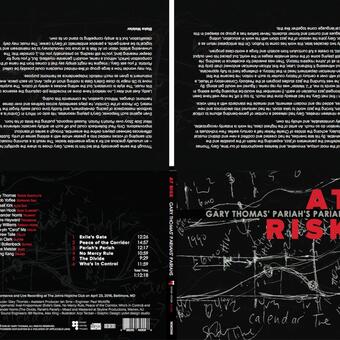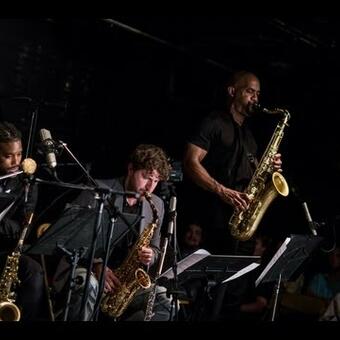Gary's profile
As a saxophonist, flutist, composer and educator, Thomas is absolutely second to none. One of the few true pioneers of our time, his contributions place him in a class of wholly individual artists who have simultaneously set the technical standard for and reinvented the language of their art. His resume evidences this, as he has worked extensively with the top names in the business, including:
Miles Davis, Wayne Shorter, Herbie Hancock, Jack DeJohnette, John McLaughlin, Pat Metheny, Terri Lyne Carrington, Jim Hall, Dave Holland, Ron Carter, Wynton Marsalis, David Sanborn, Joe Lovano, Bobby McFerrin, Sam Rivers, Vanessa Williams, Betty Carter, George Benson,, Randy Brecker, Greg Osby, John Scofield, Tony Williams, Jimmy Smith, John Patitucci, Ravi Coltrane, and a host of others.
Recent highlights include a two-year tenure with John McLaughlin, followed by several years with Herbie Hancock. Thomas was also featured on Adam Pierończyk’s Fryderyk-winning (the Polish Grammy) album, Komeda, and a slew of other projects. His presence has even come to transcend genre, working with performers as diverse as Top 40 rap artists (including extended solos on rapper Q-Tip’s The Abstract) to top orchestras, and much in between. But no matter the setting, Thomas leaves his unmistakable stamp upon the music.
Renowned as a first-call sideman, Thomas has etched out an equally compelling career as a bandleader, with eleven albums under his auspices. Two of these, By Any Means Necessary and While the Gate is Open, were named best recordings of the 1990’s by Downbeat magazine. Displaying his deft as a composer, as well as instrumentalist, By Any Means Necessary features nine highly original works. Thomas further refined his compositional style on Exile’s Gate, even crossing over into rap with The Kold Kage. His formidable oeuvre led to the See Hear Suite, a collaboration featuring over fifty visual and literary works, commissioned by Baltimore Magazine. The music was written with the literature, to represent the visual art and Baltimore City. At the other end of the spectrum, While the Gate is Open represents another side of Thomas’ output, lending his unique approach to Jazz and American songbook classics.
As an educator, Thomas has continued to forge into new ground. Founding the Peabody Conservatory Jazz Studies program, in 2001, Thomas became the first African-American department head in the school’s history. Later, he set a further precedent, becoming the first African-American endowed professor at the institute, as the Richard and Elizabeth Case Director of Jazz Studies. His work has resonated equally inside the classroom. Lauded by students and peers alike for his singular progressive method, focus on fundamentals, knowledge of educational literature and unbiased dedication, Thomas was formally recognized with the Johns Hopkins University Excellence in Teaching Award in 2012. He has taught extensively throughout the world, presenting masterclasses and lectures at:
University Of Michigan (Ann Arbor, Michigan), Royal Conservatory Of Music (Stockholm, Sweden), National Conservatory Of Music (Paris, France), Rytmisk Musikkonservatorium (Copenhagen, Denmark), Berklee College Of Music (Boston, MA), Bruckner Conservatory (Vienna, Austria), Hamburger Konservatorium, (Hamburg, Germany) among others.
Over his career, Thomas has performed as a featured artist at renowned venues such as Carnegie Hall, Avery Fisher Hall, Royal Festival Hall, Wigmore Hall, The Kolner Philharmonic, L'auditorium Stravinski, Whitla Hall, Gasteig Philharmonic, Athens Concert Hall, The Hatch Shell and The Chicago Symphony Hall. He is also highlighted in numerous texts, including The New Grove's Dictionary of Jazz, Masters of the Jazz Saxophone: The Story of the Players and Their Music, Jazz: The Rough Guide: The Essential Companion to Artists and Albums, and the Simon and Shuster publication, Miles: The Autobiography.
Born and raised in the Cherry Hill section of Baltimore City, Thomas’ rise to prominence as an international jazz icon stands as a triumph in the face of adversity. Graduating from Frederick Douglass High School, he attended one year of college at Howard University in Washington D.C., on a full scholarship, until further financial constraints halted his return. Practicing the saxophone eight hours each day (while working a full-time job), Thomas got his break with Jack DeJohnette’s Special Edition, alongside fellow saxophonist Greg Osby, followed by a spot as saxophonist with Miles Davis.
One of the few jazz masters never to migrate to New York City, Thomas attributes his unique sound and style partly to this decision. Thomas has been a competitive power lifter, and enjoys studying new languages, to which he draws a parallel to jazz and improvisation. He currently resides in Baltimore City.






